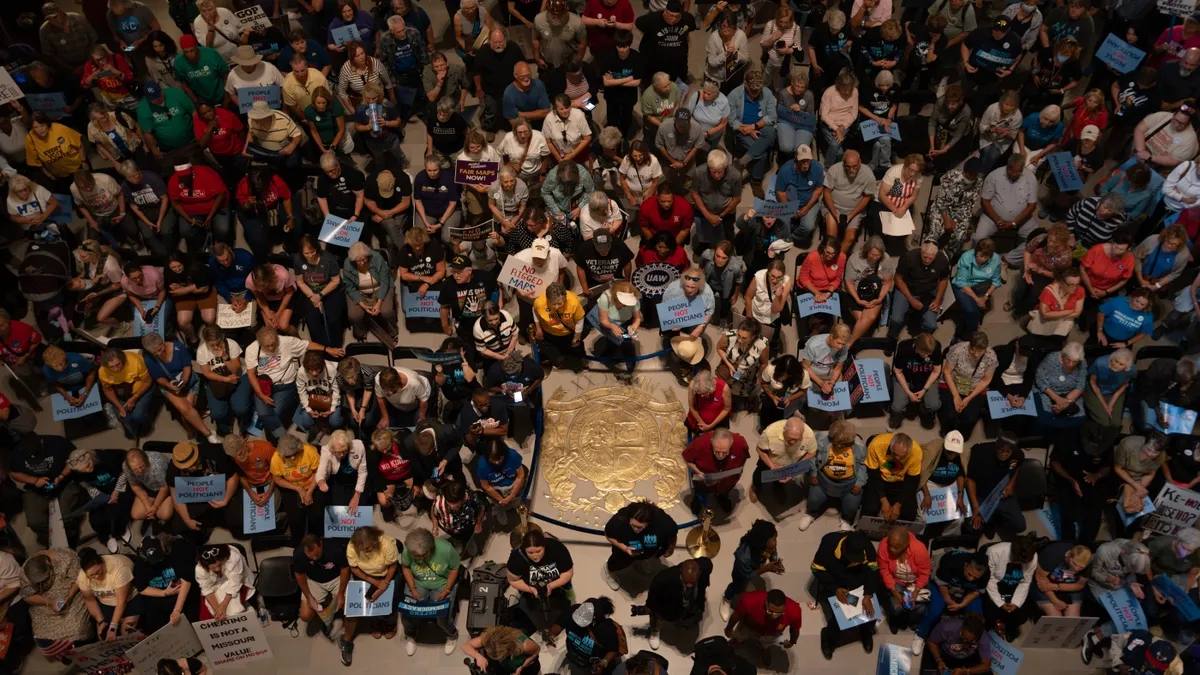
In recent weeks, Leann Villaluz has become a familiar face in neighborhoods across Kansas City, diligently knocking on doors to gather support for a petition aimed at allowing voters to decide the future of Missouri's controversial congressional map. Villaluz notes a palpable sense of resentment among voters, even those who typically engage less in political matters. "We have to pick up the slack for representatives who have been elected to do their simple duty and carry out the will of the voters," she explains, highlighting a growing frustration with elected officials who underestimate the electorate's judgment.
Missouri has gained attention as the second state, alongside Texas, to implement a gerrymandered congressional map following a nationwide redistricting effort initiated by former President Donald Trump in July. This strategic move aims to maintain Republican control of the U.S. House in the upcoming 2026 midterm elections. As a result, several states, including North Carolina, Indiana, Florida, Ohio, and Kansas, are poised to follow suit. In contrast, California is working to counterbalance Republican strategies by proposing a constitutional amendment that would favor Democrats in its redistricting efforts.
The new congressional map, signed into law by Missouri's Republican Governor Mike Kehoe, significantly alters the state's political landscape. Previously, Missouri had six Republican representatives and two Democrats in Congress. However, the revised map specifically targets the long-held seat of Democratic Rep. Emanuel Cleaver II in Kansas City. In response, Villaluz has joined forces with approximately 3,000 volunteers from a grassroots organization called People Not Politicians Missouri. Their mission is to collect over 106,000 signatures statewide by December 11 to place a referendum on the ballot in 2026, allowing voters to decide the fate of the new map.
Villaluz and her team report that they have already amassed more than 100,000 signatures and are actively continuing their outreach efforts. "Everyone I've spoken to has been excited to sign," Villaluz shares. She has been canvassing various neighborhoods, which, under the new map, would be divided into three Republican-leaning districts. Villaluz even brought her petition to a recent concert for Chappell Roan, reflecting her commitment to engaging the community in the democratic process. "Just about anyone who stops to hear what the petition is about is ready and willing to sign," she states. "Whatever your vote is, it's going to be diluted with the maps, and nobody wants that."
Despite the enthusiasm surrounding the petition, the People Not Politicians Missouri group faces significant challenges, including legal resistance from powerful state election officials. Missouri's Attorney General Catherine Hanaway has filed a lawsuit claiming that a referendum on redistricting infringes upon both the U.S. and Missouri constitutions. Additionally, Missouri Secretary of State Denny Hoskins initially rejected the group's referendum petition but later approved it, asserting that any signatures gathered prior to his approval are invalid. In a statement, Hoskins emphasized the importance of ensuring that ballot measures adhere to legal standards, stating, "Every Missourian deserves confidence that ballot measures follow the law — not out-of-state agendas or confusion campaigns."
In response to Hoskins' claims, Richard von Glahn, the executive director of People Not Politicians Missouri, accused the Secretary of State of deliberately spreading misinformation for political gain. Von Glahn argued that the state constitution permits the group to begin gathering signatures before receiving official approval. "Our campaign has gathered signatures at a historic pace," he said. "We will not be intimidated or distracted. This referendum will qualify, and Missourians — not politicians — will decide the future of fair representation in our state."
Joining this movement are individuals like Rebeca Amezcua-Hogan, who is not only a plaintiff in a lawsuit challenging the new map but also a progressive candidate for the Kansas City Council. Amezcua-Hogan argues that the mid-decade redistricting, conducted without a new census, is unconstitutional. "My own voting power would be watered down," she expresses, emphasizing the personal implications of the new map on her ability to represent her constituents effectively. As she campaigns for her council seat, she is also gathering signatures for the referendum, underscoring the interconnectedness of local and state political battles.
Amezcua-Hogan further highlights the challenges that Kansas City faces in securing federal resources, noting that splitting the city into three districts will complicate these efforts. "Kansas City is already at a point where we're dealing with a lack of affordable housing, lack of mental health resources, and lack of transportation," she explains. "It already feels like we're fighting an uphill battle, and that uphill battle is only going to get worse."
While the new congressional map swiftly passed through the Republican-controlled Missouri Legislature, it faced dissent from some GOP lawmakers. Michael Davis, a lawmaker representing a suburb south of Kansas City, defended the map, asserting that it reflects the trust voters have placed in Republican representatives to manage redistricting effectively. "We should send a conservative message to D.C.," he stated, emphasizing the need for Republican control in Congress.
However, not all Republicans supported the map. Fifteen Republican legislators, including Jon Patterson, the speaker of the Missouri House, voted against it, primarily from areas affected by the redistricting. Bill Allen, a Republican representative from Kansas City’s northland, voiced his opposition to mid-decade redistricting, expressing disappointment that Missouri is following Texas and Trump's lead. "The job of the representative is to represent the district, not the party, certainly not the president," Allen remarked, reinforcing the responsibility of elected officials to prioritize their constituents' will.
As the campaign to gather signatures continues, Villaluz remains resolute in her mission. "I feel that Missouri is used as a guinea pig by the GOP," she asserts, expressing the belief that the party underestimates the intelligence and agency of the average Missouri voter. "They think that they can get away with a lot more here in a red flyover state, but that's not the case." With grassroots activism gaining momentum, the fight for fair representation in Missouri is far from over.